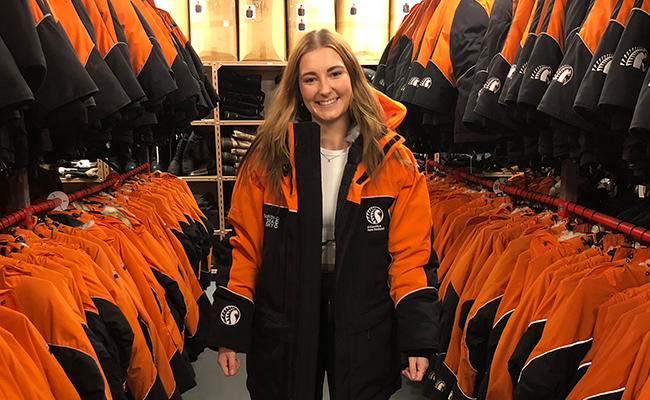
Annie Robertson recently started her job at Antarctica New Zealand after having received an A+ for her Master's thesis earlier this year.
A life-changing field trip, a lecturer offering perfect advice at the right time, a sentence that altered the trajectory of research, a surprise journey of reconnection with cultural heritage… all culminated in the offer of Annie Robertson's dream job.
Any student would be satisfied with any one of these happening during their university journey, but science communication postgraduate student Annie Robertson (Ngāi Tahu, Kāi Tahu), is able to reflect on the joyful connectivity of all these experiences during her time at Otago.
No sooner had Annie last month received her final grade of an A+ as a fitting completion to fulfil the requirements for a Master of Applied Science, when she received a call from Antarctica New Zealand offering a communications role in its science division.
“I still can't believe I have this job as it was the type of role I was aspiring to achieve sometime in the future,” Annie says. “I was shocked just getting an interview, and then just burst into tears when I was offered it.”
How Annie arrived at this point is the accumulation of her four and a half years of study at Otago, and unravelling those finer details requires winding the clock back a few years.
During her undergraduate studies in ecology, Annie enrolled in the tropical ecology paper which involved a field trip to Borneo taken by the late Professor Phil Bishop. It was a trip Annie describes as a “life-changing experience”, but it also proved life-changing for another reason.
“As an undergraduate student I was always mediocre and achieved average grades,” Annie says. “I knew I wanted to do master's and it was Phil Bishop who said to me that I'd be perfect for science communication.”
“As soon as I started studying science communication, I began getting A's and everything just seemed to fall into place from there. It also made sense, as even though I hadn't exactly noticed it before, I enjoyed telling people about science as opposed to actually doing it.”
Through childhood Annie had always been spell-bound by insects and her visits to museums involved poring over insect collections in drawers. Her continuing interest in insects was fuelled when, as part of her master's, she spent three weeks on internship with the invertebrate team in the natural history department of Te Papa Tongarewa.
'Even though I hadn't exactly noticed it before, I enjoyed telling people about science as opposed to actually doing it.'
For her internship Annie helped with developing educational displays, research and communicating about insects, and observed that what was taught in the Department of Science Communication was also relevant and applied by colleagues in the museum.
“It was during the internship that I also came across the idea of cultural entomology – how insects have shaped our culture – and I instantly fell in love with topic.”
The topic informed the production of an e-book, which Annie published earlier this year, as well as her final master's creative project researching and writing a long-form science article on the practice of tā moko tattooing.
“I stumbled across a line about how the mummified larvae of Aotearoa's native forest porina moths were used to produce black tā moko ink, and as I read more into it, I felt such a strong connection.”
“I was raised as a pakeha but found out about my Māori heritage when I was 12, so in a way I was discovering more about myself through the topic as I learnt more about it.
The resulting 7000-word article, which received a mark of A+, weaved together Annie's narrative of her personal journey of self-discovery alongside this traditional knowledge that is deeply intertwined with biodiversity and cultural identity.
“While writing the article I was also learning te reo Māori, and about Māori customs, history and culture, so I incorporated all these layers in the writing and the process supported the growth of my own identity and sense of belonging.”
Now Annie is settling into her new life in Christchurch and excited about her new kaupapa and making a stamp on her new role with Antarctica New Zealand.
“I was in a meeting the other day and just thinking about how my job is so cool. I'm surrounded by all these incredible scientists doing actual science which is making a real impact, and I'm so fortunate to get to communicate it.”
“I'm so grateful to all of those who have supported and guided my journey to this point, and I'd love to be able to give Phil Bishop a special thanks for the huge impact he had on me.”
- Kōrero by Guy Frederick, Communications Adviser Division of Sciences